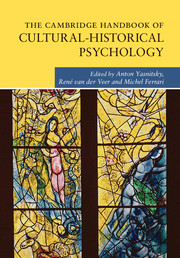Book contents
- The Cambridge Handbook of Cultural-Historical Psychology
- The Cambridge Handbook of Cultural-Historical Psychology
- Copyright page
- Contents
- Figures
- Tables
- Contributors
- Introduction
- Part I Theory
- Part II Method
- Part III Child
- Part IV Language and culture
- Part V Brain
- Part VI Beyond psychology
- 16 Cultural-historical psychotherapy
- 17 From expressive movement to the “basic problem”
- 18 The need for a dialogical science
- 19 Cognition and its master
- 20 Cultural-historical theory and semiotics
- 21 Luria and “Romantic Science”
- Index
18 - The need for a dialogical science
Considering the legacy of Russian-Soviet thinking for contemporary approaches in dialogic research
from Part VI - Beyond psychology
Published online by Cambridge University Press: 05 October 2014
- The Cambridge Handbook of Cultural-Historical Psychology
- The Cambridge Handbook of Cultural-Historical Psychology
- Copyright page
- Contents
- Figures
- Tables
- Contributors
- Introduction
- Part I Theory
- Part II Method
- Part III Child
- Part IV Language and culture
- Part V Brain
- Part VI Beyond psychology
- 16 Cultural-historical psychotherapy
- 17 From expressive movement to the “basic problem”
- 18 The need for a dialogical science
- 19 Cognition and its master
- 20 Cultural-historical theory and semiotics
- 21 Luria and “Romantic Science”
- Index
Summary
Keywords
- Type
- Chapter
- Information
- The Cambridge Handbook of Cultural-Historical Psychology , pp. 449 - 473Publisher: Cambridge University PressPrint publication year: 2014
- 1
- Cited by



